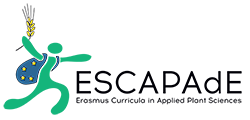English title:
Gene technology for plant pathologists
Course ID:
953318
ECTS credits:
3,0
Title in native language:
Gene technology for plant pathologists (in Eng.)
Gene technology for plant pathologists (in Eng.)
Term Semester:
Autumn/Winter
Instruction language(s):
English
Course content:
Gene technology for plant pathologists lecture deals with different molecular biology aspects and methods currently relevant in the crop production and protection such as: plant resistance, cloning, production and use of transgenic plants to improve their resistance against pathogens and pests, different methods of plant genome engineering etc.
Expected previous knowledge:
.
Learning outcomes:
Students gain knowledge of:
- Basic genetic cloning methods including PCR, restriction enzymes, different plasmids and vectors etc.
- Plant transformation tools, selection markers and reporter genes.
- Examples of transgenic plants in the field.
- Resistance genes and host resistance.
- Technics of plant genome engineering including RNAi, ZFN, TALENs and CRISP/Cas9.
- Mechanisms of plant resistance against different pests and pathogens including induced resistance, systemic acquired resistance, induced systemic resistance, ETI and PTI etc.
- The role of secondary metabolites in the plant resistance.
Learning outcomes:
Upon completion of this course, the students will be able to:
- name and explain the principles of gene cloning including the PCR, digestion with restriction enzymes, ligation and selection of transformed bacteria using different systems
- name and explain the different plant resistant mechanisms including induced resistance, systemic acquired resistance, induced systemic resistance, ETI and PTI etc.
- name the different methods of plant genome engineering
- name and explain the role of different substances in the plant resistance such as phytoalexins, phytoanticipins and different secondary metabolites
- name the transformation tools such as Agrobacterium-mediated transformation and their role in plant-pathogen studies
- name examples of selection markers and reporter genes- name and describe examples of transgenic plants in the field and assess their advantages and disadvantages
- name and explain principles of resistance genes, classes of resistance genes and the location of the corresponding proteins
- name and explain principles of perception of pathogen effectors in plants and host resistance
- Basic genetic cloning methods including PCR, restriction enzymes, different plasmids and vectors etc.
- Plant transformation tools, selection markers and reporter genes.
- Examples of transgenic plants in the field.
- Resistance genes and host resistance.
- Technics of plant genome engineering including RNAi, ZFN, TALENs and CRISP/Cas9.
- Mechanisms of plant resistance against different pests and pathogens including induced resistance, systemic acquired resistance, induced systemic resistance, ETI and PTI etc.
- The role of secondary metabolites in the plant resistance.
Learning outcomes:
Upon completion of this course, the students will be able to:
- name and explain the principles of gene cloning including the PCR, digestion with restriction enzymes, ligation and selection of transformed bacteria using different systems
- name and explain the different plant resistant mechanisms including induced resistance, systemic acquired resistance, induced systemic resistance, ETI and PTI etc.
- name the different methods of plant genome engineering
- name and explain the role of different substances in the plant resistance such as phytoalexins, phytoanticipins and different secondary metabolites
- name the transformation tools such as Agrobacterium-mediated transformation and their role in plant-pathogen studies
- name examples of selection markers and reporter genes- name and describe examples of transgenic plants in the field and assess their advantages and disadvantages
- name and explain principles of resistance genes, classes of resistance genes and the location of the corresponding proteins
- name and explain principles of perception of pathogen effectors in plants and host resistance
Exam method:
written exam including open questions and multiple-choice questions
Max. 50 points
Grades:
Max. 50 points
Grades:
Organisation: University of Natural Resources and Life Sciences Vienna
Country:
Austria
Acronym:
BOKU
ERASMUS+ code:
A WIEN03
Teaching period summer semester:
22. Feb 2021 - 30. Sep 2021
Teaching period winter semester:
13. Oct 2020 - 21. Feb 2021
University website:
